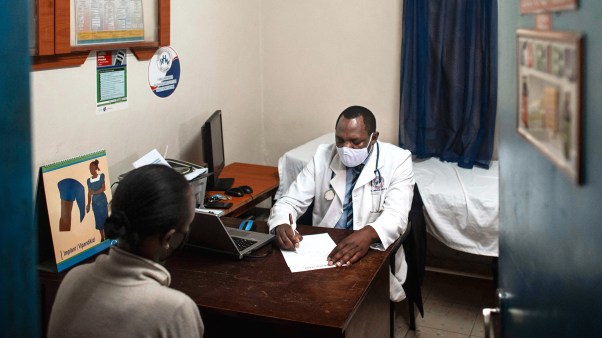The growing conflict between the Roman Catholic church and the liberation theology movement came to a head last month. The Vatican called one of the movement’s most controversial thinkers to Rome for a meeting with the church’s “official” theologian.
Liberation theology is an effort to reinterpret the biblical concern for the poor in terms of such Marxist ideas as the revolution of the proletariat against political and religious oppressors. Gustavo Gutiérrez’s A Theology of Liberation (1973) is probably the best-known early book expressing these ideas. Latin American priests and nuns sympathetic to the movement have founded thousands of “base communities” to organize the poor for political action.
The Vatican has viewed the growth of liberation theology with both sympathy and alarm. Early last month, the Sacred Congregation for the Doctrine of the Faith, the office responsible for official interpretation of Catholic theology, released a 36-page paper on the movement. The paper agrees with those who insist that “the scandal of the shocking inequality between the rich and the poor,” coupled with political oppression practiced by corrupt military dictators, can no longer be tolerated.
However, the document insists that theologians who accept Marxist solutions are adopting “a series of positions that are incompatible with the Christian vision of humanity.” The paper says they confuse the poor of the Bible with Marx’s proletariat and transform the Christian fight for the rights of the poor into “a class fight within the ideological perspective of the class struggle.” The document concludes by reminding liberation theologians that Marxists have produced some of the most oppressive nations in the world.
The Vatican released its paper four days before the Sacred Congregation for the Doctrine of the Faith summoned Leonardo Boff, a Brazilian professor of systematic theology, to discuss certain ideas in his book Church: Charisma and Power. Boff argues that in the eyes of the poor, the Catholic church’s heirarchy can look like a religious version of a political oppressor.
The Franciscan priest is a leading thinker in the liberation theology movement. He received his doctorate at the University of Munich under the late theologian Karl Rahner. Boff has written several major theological works, the best known of which is Jesus Christ Liberator. He is writing a systematic theology that reinterprets traditional dogmatic theology from the standpoint of the oppression and alienation of the poor in Latin America.
Boff arrived in Rome with three of Brazil’s highest ranking prelates—all of them supporters of Boff’s ideas. At the end of his four-hour session with Joseph Cardinal Ratzinger, head of the Sacred Congregation for the Doctrine of the Faith, Boff read a statement approved by Ratzinger. The fact that there was no statement from Ratzinger is believed to reflect Pope John Paul II’s desire to deal firmly with potential doctrinal deviation without creating the impression of an inquisition.
Though Boff said the meeting was “tranquil and cordial,” there are signs that agreement has not been reached. The Brazilian priest told reporters that the Vatican’s document on liberation theology was not sufficiently aware of the Latin American situation. At the same time, L’Osservatore Romano, the Vatican’s official newspaper, published statements from bishops and other church leaders from Latin America and elsewhere that were critical of Boff’s position.
Evangelicals familiar with liberation theology say the Catholic church has been slow in issuing a statement on the movement. Ronald Nash, head of the Department of Philosopy and Religion at Western Kentucky University and editor of the recently published Liberation Theology (Mott Media), says the movement is one of the two major heresies in the contemporary Christian church. (The other, he says, is process theology.)
“I applaud the Pope’s attempts to rein in those Roman Catholics who are advocates of liberation theology,” Nash said. “Like any serious heresy, liberation theology is a threat not only to the belief of evangelicals but also to those they hold in common with Roman Catholics. It’s a heresy that can only bring Latin America to greater grief and poverty.”
What is needed, Nash said, is a liberation theology based on capitalism. “Socialism, Marxism, and left-wing political and economic programs can’t work,” he said. “They will only increase the people’s misery.”
Joseph Spinella, chairman of the Department of Missions and Evangelism at Washington Bible College in Lanham, Maryland, did his doctoral dissertation on liberation theology. “Liberation theology is strong and is tolerated in all Third World areas, especially in the Catholic church,” he said. “Whether Boff’s trip to Rome is the sign of future confrontation, or whether liberation theology will continue to be influential, only time will tell.”










